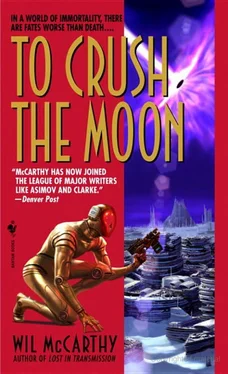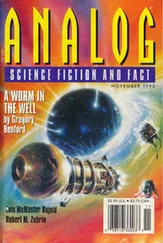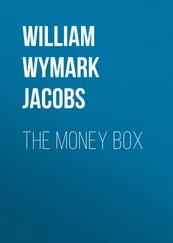Meanwhile there were factories abuilding, for the production of certain specialized machineries. There had been neutronium barges scouring the heavens around Sol for fifteen hundred years, and Conrad’s people simply tweaked and reinforced the design, so that it could roll across a tunnel floor on house-sized treads and eat through solid rock rather than flying through diffuse clouds of ice and dust.
But it was fundamentally the same machine: a blunt cylinder a thousand meters long and seven hundred wide, with a yawning open mouth that could swallow literally anything. And on the day these machines were first fired up, the moon trembled and groaned beneath its wellglass domes, and the remaining population—angry holdouts defiant to the end—were evicted by their own police or, in a handful of cases where the police themselves were holdouts, by the SWAT robots of the Royal Constabulary.
Conrad’s own escort of Law Enforcers got a bit of a workout as well, when Fatalist or naturalist saboteurs succeeded in bringing a tunnel down on top of him. His body was crushed beyond repair, and he would just as soon have died and reprinted, but the Enforcers managed to save his head and toss it, fainting and throbbing with agony—into the nearest fax.
“Don’t,” he tried to tell them, but without breath or vocal cords he didn’t make much of an impression, and the Enforcers either couldn’t read lips, didn’t care to, or had been programmed to ignore his dying wishes. Still, they needn’t have bothered; this “rescue” saved a grand total of five hours’ stored experience, of which the pain itself was the only thing he would really remember.
Conrad was later to mark this event as the end of an era—one of many he’d encountered in his long strange life. His beheading coincided with the start of a time crunch that no amount of plurality could really abate. Being in five places at once was all well and good, but the real trick was coordination, and for that he had to know everything, instantly. He did the best he could, which really wasn’t bad, and he made an effort to keep up his home life as well. And with love, money, recognition, and meaningful work, it wasn’t a bad way to live. Just a very, very busy one.
Soon, the months and years and decades were passing in a kind of daydream; his world never changed, or rather it changed slowly and at his own command. In the outer universe, art and fashion and politics morphed swiftly by comparison, when he bothered to notice. Which was rarely, and this is truly saying something, for his own wife had become a politician herself! He breathed her air, listened attentively to her stories, and yet remained somehow detached or aloof.
Was this what it felt like to be Bruno de Towaji? Consumed by the practical difficulties separating plan and theory from hard reality? Anchored only by the love of a good woman? For her part, Xmary seemed to understand; Conrad had never been happier, and a part of each of them suspected he never would be again. “These,” she told him once, “are the good old days. Savor each one, for they’ll never come again.”
Not that it was a peaceful time. Far from it! More and more tunnels collapsed, some by accident and some by malevolence, but most because that was how they were supposed to work: the neutronium bores would hollow out the ground and then bring it crashing down behind them. Deaths and manglings by misadventure were a part of the monthly routine; by its very nature, this workplace could not be made safe, any more than a shifting volcano of boulders and razor-sharp knives could be safe. Rest assured, through their labors the project’s burgeoning crew learned a thing or two about pain and loss and recovery.
But in the best of worlds, learning does modify behavior. Few of Luna’s workers died more than twice. It became, in a way, a rite of passage, except for Conrad himself, who well remembered his faxless days on Sorrow and could not be bothered to die even once. “I hope to lead by example,” he told his crew on several occasions, when Bell Daniel teased him about it.
And so, year by year the moon changed and shrunk as the mass beneath its surface was squozen into neubles and packed down into diamond plates near the solid core. And as the lithosphere’s diameter approached its final value, the bores’ work became slower and more precise. A traditional sculptor cuts first with a jackhammer, then with a chisel, then an awl, and finally with a rasp and a file and a block of heated wellstone to smooth and polish. Such was the role of the destruction crew in those last eighty years: finessing the rubble of Luna into something new and wonderful.
Of course, an odd thing was happening by this point: the moon had begun to retain air. It wasn’t much at first—just a bit of outgassed oxygen, combining with a bit of hydrogen from the solar wind. The pressure could be measured in microbars—millionths of a breathable atmosphere—but overnight it seemed to change the texture of the soil and rocks at the surface, which had never before felt the touch of anything but vacuum.
And then the first of the gigantic atmosphere-processing faxes had been lowered into place along the Nearside equator. Tied to a network gate, it called down nitrogen from Titan, carbon dioxide from Venus, methane and heavy nobles from a spherical station adrift in the atmosphere of Jupiter. The Elementals grew wealthier still, for who but they could arrange such enormous transfers of purified mass? And then, before the atmosphere had achieved even a tenth of its final density, a second fax was placed on the Farside to crack additional oxygen from the soil itself, and to combine some fraction of it with the carbon and hydrogen and nitrogen to produce a gray, reeking smog of water and hydrocarbons, fats and other complex organics which would be useful in conditioning the soil for the arrival of life.
And indeed, life was not far behind; soon the surface was crawling with dainty labor robots, spreading and raking and watering and fertilizing a powder of microscopic spores. This had few visible effects, but on the visceral level it struck a deep chord: for the first time in its 4.5-billion-year history, this world was waking up. Suddenly it had a smell, a feel, a sky under which you could walk without protection. Whether the Fatalists and naturalists liked it or not, the history of Luna would be forevermore shaped by living things.
Which was good, because the flow of refugees from the colonies now exceeded the Queendom’s own population growth by an order of magnitude, and was expected to continue increasing. If crushing the moon had once been a forward-thinking solution to long-term problems, it was now a grim and immediate necessity. But that was a political matter, and Conrad felt justified in letting other people worry about it. After all, he was just an architect.
“Don’t lose too much contact with reality,” advised King Bruno on one of his status-check visits, when Conrad made some comment along these lines. “Believe me, even on Maplesphere things are easier when I keep the end users in mind. I’ve wasted years of my life solving the wrong problems, and now I should like to have them back. I’ve lost arms inside a wormhole, lad, but never my entire self.”
But in spite of the king’s warnings, Conrad found himself spending less time on Grace—his nominal home—and more here on this squozen moon, whose lifelessness had begun, suddenly, to seem precious even to him, in the way that all things become precious when their time is nearly over. Another era of his personal history—and Luna’s—was drawing to a close. And not only theirs; all the Queendom seemed to be drawing its collective breath, preparing for some new spasm of change. And as Conrad became aware of this, as his gaze turned finally outward, he found all the eyes of the Queendom looking in at him with worried impatience.
Читать дальше












